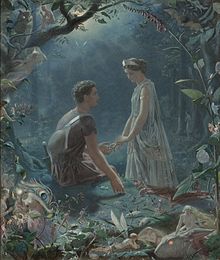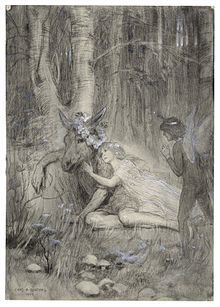. . . and thus begins a play filled with magic and frolic, that along the way manages to reveal essential truths about human emotion and ends with three happy human couples plus a fairy king and queen who have finally worked out their differences.
If you are wondering how a 16th Century play could possibly have anything to do with investing, it doesn’t. But it does illustrate a point about time and truth. When Lysander speaks of the course of true love, he speaks of time. He also says true love as opposed to false passion created through magical intervention. If one were to leave before the play’s happy conclusion, one might come away thinking it was a tragedy, not a comedy.
Like the characters, the audience must persevere to find the ultimate reward.

Watercolor by John Simons (1870) of Hermia and Lysander
Lysander
Act 1, Scene 1
A Midsummer Night’s Dream
By William Shakespeare
What audiences learn from A Midsummer Night’s Dream is that nothing worth having simply falls into our laps. Would Nick Bottom, an ordinary fool, ever have a chance of winning the true love of Titania, the exquisite Fairy Queen? Especially when his head has been transformed into that of a donkey? (This is one of those times when Shakespeare really pounds home the imagery in case his audience didn’t get that this guy is not Everyman, but literally a jackass.)
Yet Titania falls into Bottom’s lap after Oberon’s minion, Puck, induces a facsimile of love through the juice of a magical flower. Neither enchantment lasts, and sense and sensibility are eventually restored to both characters.
The term “puckish,” meaning playful in a mischievous but harmless manner, derives from this character. Once again, if one were to leave before the end of the play, one would not find Puck harmless, but rather a horrible, meddling demon that heartlessly plays with other characters’ feelings for his own amusement.
And so it goes with our investment portfolios. The course of our investment runs no more smoothly than Love. If we invest at the top of a market curve, we are destined to eventually find the bottom of that curve. We are doomed only if we choose that moment to exit. If we just wait until the play is finished, it will all come out right in the end. By the end of A Midsummer Night’s Dream each of our protagonists is paired with the proper lover.

Drawing of Bottom, Titania and Puck by Charles Buchel (1904)
The running time of the full text with scene changes and intermissions takes over two hours. Let’s remember that the original Globe Theatre, like the current version in London today, was a theatre in the round open to the elements. Like the modern theatre, it was on the banks of the River Thames, a damp and chill location even in the middle of summer. The cheapest ticket was for standing room at the foot of the stage. These ticket holders, called “Groundlings” stood throughout the long performance. Those with more jingle in their pockets could sit on narrow benches under a covered roof, and could even pay a little extra for a cushion or a blanket. In any case, this was entertainment for the hearty.
My last post about market volatility concluded that in the eternal scheme of things, the stock market spends more time up than down. Volatility may be short-term, but when one is going through it, it cannot end soon enough. A market downswing can be painful to watch! We can choose to forego investing at all, but then we risk running out of money before we run out of time. And no one wishes to face that murky prospect.
It helps to put things in perspective. Sometimes my daughter, now age twenty-three, will begin a sentence with the words “fourteen hours.” This refers to how long I was in labor before giving birth to her. Ultimately, that sentence will end with a testament of my love for her, because I was willing to endure fourteen hours of labor to finally meet her. Six years later, I did it all over again to meet her younger brother. The trifling inconvenience of momentary agony has paid untold dividends.

Groundlings at the Modern Globe Theatre along the River Thames, London, England (2015)
If we did not occasionally endure discomfort and misadventure, would we even know what comfort and security are? I don’t think I would enjoy being a real-life Hermia, scorned by both my father’s choice and my own heart’s desire. I also know myself well enough to know that like Hermia, I would not give up and join a convent. I would wait until my Lysander came to his true senses. So, for Hermia and all the rest of us, willingness to persevere through often odd and confusing circumstances, yields our eventual and lasting reward.
